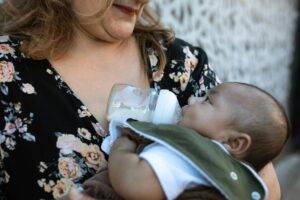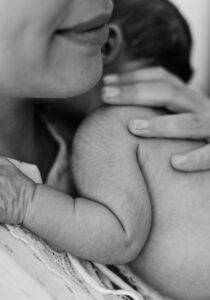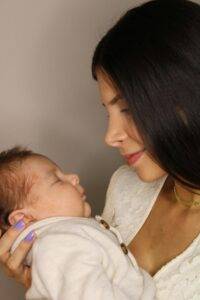As a new parent, you’ll encounter many firsts with your baby—first smiles, first steps, and even the first time they hiccup. Newborn baby hiccups may come as a surprise, especially if they seem frequent. It’s natural to wonder why your little one is hiccuping and whether it’s something to worry about.
Rest assured, newborn baby hiccups are a common and generally harmless occurrence. This article will explore essential facts about newborn baby hiccups that every parent should understand.
1. What Are Hiccups and Why Do They Happen in Newborns?
To understand why newborn baby hiccups, we need to break down what hiccups are. Hiccups are involuntary contractions of the diaphragm, a large muscle below the lungs that plays a crucial role in breathing. When the diaphragm suddenly contracts, it causes the vocal cords to close quickly, resulting in the distinct “hic” sound.
Newborn baby hiccups happen due to the immaturity of their digestive and respiratory systems. As their bodies grow and develop, their diaphragm learns to coordinate with breathing. This explains why hiccups are common in the early weeks and months of life.
Feeding: A Common Trigger
Newborn baby hiccups often occur after feeding. This happens if the baby swallows too much air while breastfeeding or bottle feeding. When air gets trapped in the stomach, it pushes against the diaphragm, causing it to spasm and lead to hiccups.
- Overfeeding: If your baby’s stomach becomes too full, the rapid stretching of the stomach irritates the diaphragm. Monitor feeding pace and avoid overfeeding, especially if your baby tends to hiccup after meals.
- Sudden Temperature Changes: Babies are sensitive to changes in their environment, including shifts in temperature. A sudden change in room temperature or going from a warm bath to cooler air causes the diaphragm to contract, leading to hiccups.
- Excitement or Stimulation: Newborns’ nervous systems are still developing, and their reactions to sensory stimuli are sometimes unpredictable, including their response to overstimulation.
2. Are Hiccups Harmful to Newborns?
This is one of the most common questions from parents. The short answer is no—newborn baby hiccups are generally harmless and don’t cause discomfort to the baby. Unlike adults, who may find hiccups annoying, babies aren’t bothered. Many babies continue feeding, playing, or sleeping through a hiccup episode.
Newborn baby hiccups are a natural part of their development and are usually no cause for alarm. They’re common in the first few months as the baby’s diaphragm matures and their digestive system learns to coordinate.
When to Be Concerned
While hiccups are typically harmless, instances may indicate an underlying issue. If you notice that your baby seems uncomfortable or distressed while hiccupping, or if hiccups are accompanied by vomiting, arching their back, or difficulty feeding, it could be an indicator of gastroesophageal reflux disease (GERD).
GERD occurs when stomach acid flows back into the esophagus, irritating the lining and causing more frequent hiccups. If your baby has persistent hiccups that interfere with feeding or sleep, consult your pediatrician to rule out GERD or other conditions.
3. Can You Prevent Newborn Hiccups?
While it’s impossible to prevent hiccups, there are several strategies to reduce their frequency. The key is to minimize the triggers such as air swallowing and overfeeding.
Tips to Prevent Hiccups
- Burping Frequently: This is one of the most effective ways. Burp your baby during and after feedings to release air trapped in the stomach before it causes hiccups.
- Slow Feeding: This is related to the pacing of feeding your baby. Opt for a slow-flow nipple designed for newborns to help regulate the pacing and reduce the volume of air swallowed by your baby when bottle feeding. If breastfeeding, try short and more frequent feeds to avoid overwhelming the baby’s stomach.
- Upright Position: Holding your baby upright during feeding and 20-30 minutes after feeding prevents air from being trapped in the stomach and reduces the likelihood of hiccups. Additionally, an upright position helps mitigate reflux issues in newborn feeding.
- Avoid Overstimulation: Babies who are excited or overstimulated hiccup more frequently. Create a calm environment during feeding to avoid unnecessary excitement.
4. How to Handle Hiccups During Feedings
Hiccups sometimes occur during feedings, which can frustrate you and your baby. If your baby starts hiccuping while eating, pause the feeding and burp your baby before resuming. This allows the diaphragm to relax and may stop the hiccups from continuing.
What Not to Do
Many parents are tempted to use remedies like water or sugar water to stop hiccups, but these aren’t recommended for newborns. Newborns should not be given water as their kidneys aren’t yet fully developed. Remedies like startling the baby are unnecessary and can be distressing.
Instead, allow the hiccups to pass on their own. In most cases, they will resolve within a few minutes. If your baby seems happy and comfortable despite the hiccups, there’s no need to worry.
5. How Long Do Newborn Hiccups Last?
For most newborns, hiccups are short-lived. They last anywhere from a few minutes to 20 minutes or more. Most episodes resolve on their own without needing intervention.
Frequency of Hiccups
Babies also normally experience hiccups several times a day, particularly in the first few months. Hiccups will become less frequent as your baby grows and their diaphragm matures. When your baby is 6–12 months old, you’ll notice a significant decrease in hiccup episodes. However, if your baby’s hiccups seem unusually frequent or prolonged, bring it up with your pediatrician to rule out any potential issues.
Hiccups During Sleep
You may notice your baby hiccuping even while they’re asleep. This is normal and usually isn’t a cause for concern. If the hiccups don’t wake your baby up, there’s no need to intervene. Many babies sleep right through their hiccups without any problems.
6. Why Do Babies Hiccup in the Womb?
Believe it or not, babies can hiccup before they’re even born! Fetal hiccups are common, especially in the third trimester of pregnancy. Expectant mothers may feel rhythmic, jerky movements in their belly, believed to be the baby hiccuping in the womb.
Why Do Fetal Hiccups Happen?
While the exact reason for fetal hiccups isn’t fully understood, many researchers believe it’s a normal part of lung development. The hiccup-like movements strengthen the diaphragm and prepare the baby for breathing after birth. Some studies suggest that fetal hiccups may also play a role in regulating the amount of amniotic fluid the baby swallows, maintaining the proper balance of fluids in the womb.
Are Fetal Hiccups Normal?
Fetal hiccups are signs that your baby is healthy and developing normally. However, if you notice a sudden increase in frequency or if they persist for an unusually long time, mention it to your healthcare provider during a prenatal visit. While it’s nothing to worry about, your doctor may check the baby’s overall health and development.
7. When Should You Be Concerned About Baby Hiccups?
As discussed, newborn hiccups are generally harmless and don’t require special treatment. However, there are instances when frequent or prolonged hiccups could be a sign of a deeper issue, such as gastroesophageal reflux disease (GERD) or other digestive concerns.
Signs of a Problem
Closely watch your baby’s behavior during hiccup episodes. If your baby seems distressed, uncomfortable, or in pain, this could indicate an underlying problem. Other signs that something may be wrong include:
- Hiccups lasting longer than 30 minutes
- Frequent hiccups that interfere with feeding or sleep
- Hiccups accompanied by frequent spitting up or vomiting
- Crying or arching of the back during or after feeding
When to Call the Doctor
If you notice any of the above symptoms, visit your pediatrician. They will assess whether your baby’s hiccups are related to reflux or another issue and recommend appropriate treatment if needed.
Your pediatrician may evaluate for GERD. Babies with GERD have accompanying symptoms of frequent spit-up, irritability, and feeding difficulties. Thankfully, GERD is managed with feeding techniques, medications, or other interventions.
Understand Your Newborn Baby Hiccup
Newborn hiccups are a normal part of infancy and common during the early months of life. They’re typically harmless and don’t cause discomfort to your baby. By understanding the common triggers, you can take steps to minimize their frequency.
Simple actions like burping your baby during and after feedings, keeping them upright, and feeding them slowly can help reduce the chances of hiccup episodes. Hiccups are usually nothing to worry about, but if you notice persistent episodes or discomfort, consult your pediatrician to rule out any underlying issues.
With time, your baby will outgrow frequent hiccups as their digestive and respiratory systems mature. For more parenting tips and health advice for your little one, visit Omega Pediatrics for expert insights and guidance. Check out these articles:
- Understanding and Managing Infant Constipation: Comprehensive Guide for All Parents
- 4 Things to Consider in Creating a Safe Sleep Environment for Your Baby







